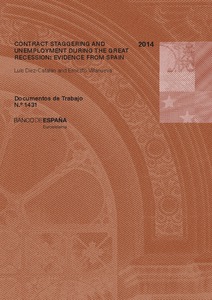Contract staggering and unemployment during the great recession: evidence from Spain
"We study the impact of (widespread) downward wage rigidity on the flows from employment to non-employment at the onset of the Great Recession. Downward wage (growth) rigidity is due to the fact that sector-level collective agreements in Spain are automatically extended to all firms, setting wa...
| Main Authors: | , |
|---|---|
| Institution: | ETUI-European Trade Union Institute |
| Format: | TEXT |
| Language: | English |
| Published: |
Madrid
2014
Banco de Españ |
| Subjects: | |
| Online Access: | https://www.labourline.org/KENTIKA-19114888124919320609-Contract-staggering-and-unempl.htm |
| Summary: | "We study the impact of (widespread) downward wage rigidity on the flows from employment to non-employment at the onset of the Great Recession. Downward wage (growth) rigidity is due to the fact that sector-level collective agreements in Spain are automatically extended to all firms, setting wage minima for workers in the same province-industry-skill cell. We identify the impact of wage rigidity on employment because, unlike settled ones, newly bargained contracts can adjust to aggregate shocks. Using the exact dates of bargaining periods of all sector-level contracts in Spain, we find that agreements reached after the fall of Lehman Brothers were for an average wage growth of 1.8%, while agreements signed before 15 September 2008 were for mean wage increases of 3.1%. Matching information on collective agreements with longitudinal Social Security records on workers, we document two findings. Firstly, the probability of job loss between 2009 and 2010 was 1 percent higher among workers covered by agreements signed before the fall of Lehman Brothers than among workers covered by contracts signed afterwards. Secondly, the analysis of a subsample of contracts with information about the exact province-industry-skill level minimum wage suggests that the impact of date of contract signature on wage changes and employment losses is confined to workers whose pre-recession earnings were below 1.2 times the contract-specific minimum wage. Those findings are consistent with the hypothesis that the staggering of contracts and the inability to renegotiate contracts amplify aggregate shocks. We end with a discussion of whether those results can be extrapolated to other sample periods." |
|---|---|
| Physical Description: | 51 p. Digital |

